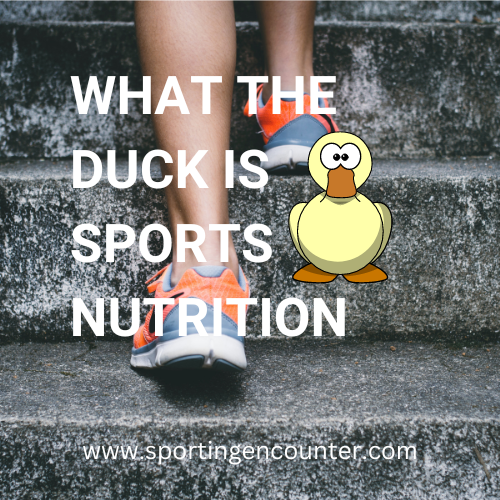Nutrition is one thing what the duck is sports nutrition?
Sports nutrition as the name suggests is for people who practice sports seriously.
It could help professional sportsmen also recreational sportsmen who follow their sport diligently.
The point of the matter is that the duck is sports nutrition.
Let’s find out…
Our body is an intelligent mechanism. It adapts to all the adversities we are subject to in our bodies.
However, when you are living a normal life like a day-to-day activity You need to balance your food according to your daily requirement.
However, when you follow some sport, it is mandatory to train for it.
If you don’t train, it could cause injuries.
So when you do any activity which is not what a regular person would do, it is common sense that your
the body ends up using the energy source from your bones, your muscles etc.
So when the resource from your body is used up it is no rocket science to
know that we need to reimburse the body for those nutrients.
So a person needs to balance his/her parameters by with the right nutrition.
That Duck is called sports nutrition.
What is sports nutrition ?
Sports nutrition in a nutshell means the study and a diet plan especially designed to increase athletic performance. Have you ever seen any vehicle move without fuel? How do you expect your body to perform better in sports without the right nutrition?
So in short the right nutrition, ample rest, and the right training is key to a good performance.
Of course, discipline and dedication are of utmost importance as well.
Sports nutrition is a critical component of athletic performance.
Proper nutrition can help athletes optimize their physical abilities,
enhance their mental focus and endurance, and prevent injury.
It can also help
them achieve their personal bests in competition.
What are the three principles of Sports nutrition?
Sports nutrition involves the consumption of nutrients in the right amounts,
at the right time, to support the demands of training and competition.
In this article, we will explore how sports nutrition can help in improving the
performance of a sportsperson.
Energy balance
Energy balance is the key to sports nutrition. An athlete’s energy balance is the
balance between energy intake (calories consumed) and energy expenditure
(calories burned). Athletes need to consume enough calories to meet the demands
of their training and competition. If they consume too few calories, they may
experience fatigue, weakness, and poor performance. If they consume too many
calories, they may gain weight and lose mobility, which could also impact
performance.
Carbohydrates
Carbohydrates are the primary fuel for athletic performance. They provide energy
for the muscles during exercise and replenish the glycogen stores in the muscles
and liver after exercise. Athletes need to consume enough carbohydrates to meet
their energy needs and to replenish their glycogen stores after exercise. Good
sources of carbohydrates include whole grains, fruits, vegetables, and legumes.
Protein is essential for muscle repair and growth. Athletes need to consume
enough protein to support their training and to repair and grow their muscles
after exercise. Good sources of protein include lean meat, poultry, fish, eggs,
dairy products, and plant-based sources such as beans, nuts, and seeds.
Hydration is crucial for athletic performance. Athletes need to stay hydrated
before, during, and after exercise to maintain optimal performance. Dehydration
can lead to fatigue, weakness, and poor performance. Athletes should aim to
drink enough fluids to replace the water lost through sweating during exercise.
Good sources of fluids include water, sports drinks, and fruit juices.
Vitamins and Minerals
Vitamins and minerals play a critical role in sports nutrition. They are essential
for the body to function properly, and athletes need to consume enough of them
to support their training and performance.
Good sources of vitamins and minerals
include fruits, vegetables, whole grains, dairy products, and lean meats.
Timing of Nutrition
The timing of nutrition is essential for athletic performance. Athletes need to
consume the right nutrients at the right time to support their training
and performance. For example, athletes need to consume carbohydrates
before exercise to provide energy for the muscles during exercise. They also
need to consume carbohydrates and protein after exercise to replenish
glycogen stores and to repair and grow muscles. The timing of hydration is
also critical. Athletes should drink fluids before, during, and after exercise
to maintain optimal performance.
Injury Prevention and Recovery
Sports nutrition can also play a role in injury prevention and recovery.
Athletes need to consume enough nutrients to support the repair and recovery of their muscles after exercise.
Adequate protein intake can help repair muscle damage and support muscle growth. Consuming antioxidants, such as vitamins C and E, can also help reduce inflammation and promote recovery.
Mental Focus
Mental focus is crucial for athletic performance. Nutrition can also play a role in mental focus.
Athletes need to consume enough carbohydrates to provide energy for the brain, and enough B vitamins to support brain function.
Adequate hydration is also essential for mental focus, as dehydration can lead to fatigue, confusion, and poor performance.
In conclusion, sports nutrition is critical for athletic performance.
Athletes need to consume enough calories, carbohydrates, protein, vitamins, and minerals to support their training and performance.
They also need to consume the right nutrients at the right time to optimize their performance.
Adequate hydration and proper nutrition can help prevent injury and
how does vitamin B12 help in sports performance
Vitamin B12 is an essential nutrient for the body that plays an important role in energy metabolism and the maintenance of a healthy nervous system.
It is also involved in the production of red blood cells, which are responsible for carrying oxygen to the muscles.
As a result, vitamin B12 is a critical nutrient for sports performance, and athletes need to ensure they are consuming enough of this nutrient to support their training and competition.
Energy Production
Vitamin B12 plays a crucial role in energy production.
It is involved in the metabolism of carbohydrates, proteins, and fats, which are the primary sources of energy for the body.
During exercise, the body’s demand for energy increases, and vitamin B12 helps to ensure that the energy-producing pathways are functioning optimally.
Without enough vitamin B12, athletes may experience fatigue, weakness, and poor performance.
Red Blood Cell Production
Vitamin B12 is also involved in the production of red blood cells.
Red blood cells are responsible for carrying oxygen to the muscles, which is essential for athletic performance.
During exercise, the demand for oxygen increases, and athletes need to ensure that their red blood cell count is adequate to support their performance.
Without enough vitamin B12, the body may produce fewer red blood cells, impairing athletic performance.
Nervous System Function
Vitamin B12 is critical for the healthy functioning of the nervous system.
It is involved in the production of myelin, a fatty substance that surrounds and protects nerve fibres. Myelin is essential for the transmission of nerve impulses, which are critical for muscle contraction and coordination.
Without enough vitamin B12, athletes may experience numbness, tingling, and weakness in their muscles, which could impair their performance.
Sources of Vitamin B12
Vitamin B12 is found primarily in animal-based foods, such as meat, poultry, fish, eggs, and dairy products.
Plant-based sources of vitamin B12 are limited, and vegetarians and vegans may need to take a supplement to ensure they are getting enough of this nutrient.
Athletes who follow a plant-based diet should ensure that they are consuming enough vitamin B12 to support their athletic performance.
In conclusion, vitamin B12 plays a critical role in sports performance.
It is involved in energy production, red blood cell production, and nervous system function, all of which are essential for athletic performance.
Athletes need to ensure that they are consuming enough vitamin B12 through their diet or supplements to support their training and competition.
Adequate vitamin B12 intake can help athletes optimize their performance and achieve their personal bests.
how does protein help in sports performance kindly elaborate in details
Protein is an essential nutrient for the body that plays a critical role in sports performance.
Athletes have higher protein requirements than sedentary individuals because protein is involved in muscle repair, growth, and maintenance, which are all critical for athletic performance.
In this article, we’ll dive into how protein helps in sports performance and why it’s essential for athletes to consume adequate amounts of this nutrient.
During exercise, the muscles undergo stress and damage, which can lead to muscle soreness and fatigue. Protein plays a crucial role in repairing damaged muscle tissue and promoting recovery after exercise.
When athletes consume protein after exercise, the amino acids in the protein are broken down and used to repair the muscle fibers. This process leads to an increase in muscle mass and strength over time, which can improve athletic performance.
In addition to repairing damaged muscle tissue, protein also plays a crucial role in muscle growth. Athletes who are looking to increase their muscle mass and strength need to consume enough protein to support this process. When athletes perform resistance training, the muscles undergo micro-tears, which are repaired with the help of dietary protein. Over time, this process leads to an increase in muscle mass and strength.
Protein is also essential for the maintenance of muscle mass. Athletes who are in a calorie deficit or who are not consuming enough protein may experience muscle loss, which can impair athletic performance. Consuming adequate amounts of protein can help athletes maintain their muscle mass and prevent muscle loss.
Protein is a highly satiating nutrient, which means that it can help athletes feel full and satisfied after meals. This satiety effect can be beneficial for athletes who are looking to manage their weight or reduce their calorie intake. Consuming adequate amounts of protein can help athletes feel fuller for longer, which can reduce their overall calorie intake and support weight management.
Sources of Protein
Protein is found in a variety of foods, including meat, poultry, fish, eggs, dairy products, legumes, nuts, and seeds. Athletes should aim to consume a variety of protein sources to ensure they are getting all the essential amino acids their body needs. In addition to whole foods, protein supplements such as whey protein, casein protein, and plant-based protein powders can be a convenient way to increase protein intake.
Conclusion
In conclusion, protein plays a critical role in sports performance. It is involved in muscle repair, growth, and maintenance, which are all essential for athletic performance. Athletes need to consume adequate amounts of protein to support their training and competition, and they should aim to consume a variety of protein sources to ensure they are getting all the essential amino acids their body needs. By incorporating protein into their diet, athletes can optimize their performance, recover faster, and achieve their personal bests.

